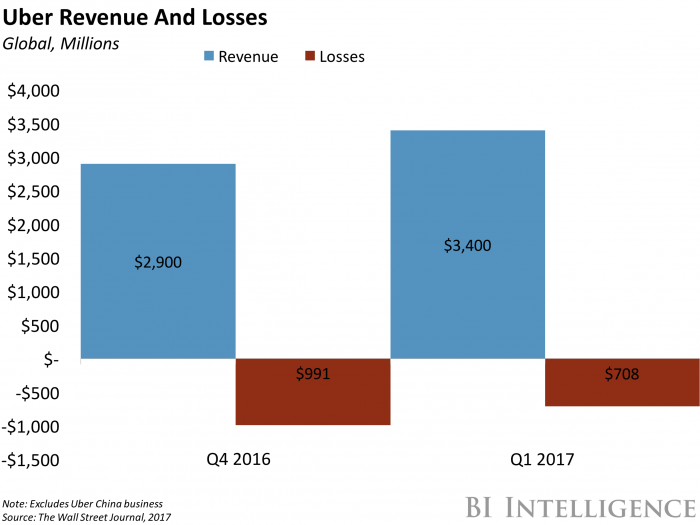Uber and Waymo are marching toward trial

BI Intelligence
This story was delivered to BI Intelligence IoT Briefing subscribers. To learn more and subscribe, please click here.
A pair of court rulings against Uber in the lawsuit brought by Waymo over self-driving technology seem to bode well for the Alphabet unit.
They come after Uber fired Anthony Levandowski, the former Alphabet engineer whose startup Otto was acquired by Uber and set off the chain of events leading to Waymo’s suit, when he failed to cooperate with the company’s attorneys in preparing a defense and complying with court orders.
Here are the most recent rulings:
A magistrate judge ruled that the due diligence report prepared for Uber by attorneys preceding the $680 million Otto acquisition must be turned over to Waymo. Uber had maintained that the report should be protected by attorney-client privilege, but that argument was rejected. The due diligence report will tell Waymo and the court what Uber knew and didn’t know prior to finalizing the acquisition of Otto, including risks and liabilities coming with the startup.
Judge William Alsup, the judge presiding over the suit, rejected a request from Uber to delay the trial — set to commence October 2 — pending an appeal to move the case to arbitration. Waymo did not name Lewandowski as a party in this suit, but Uber’s attorneys have argued that the dispute concerns Levandowski’s employment agreement with Alphabet and should be resolved in arbitration, rather than in a trial.
This all seems like good news for Waymo, but there’s a long time still until the case comes to trial. Alsup urged the self-driving spinoff to withdraw a number of patent violation claims on which he did not think it could prove infringement. Waymo’s attorneys are going to have to figure out how to show the court not just that Levandowski potentially stole private information, but that Uber acquired Otto and developed its self-driving technology with at least some understanding of this — which could be challenging given Levandowski’s noncooperation.
All sorts of companies, including Uber, are banking on self-driving tech as the foundation for critical future platforms —Uber is looking to autonomous cars to drop costs and reverse the hundreds of millions of dollars it loses every quarter — and a setback for the ride-hailing leader could have disastrous long-term consequences.
The self-driving car is no longer a futuristic fantasy. Consumers can already buy vehicles that, within a few years time, will get software updates enabling them to hit the road without the need for a driver.
This autonomous revolution will upend the automotive sector and disrupt huge swaths of the economy, while radically improving energy efficiency and changing the way people approach transport around the world.
Automakers and tech companies are racing to develop the technology that will power self-driving cars in the coming years. That tech is advancing, but leaves observers with a bigger question: will consumers trust driverless car tech, and will they want to use autonomous cars?
Peter Newman, research analyst for BI Intelligence, Business Insider's premium research service, has compiled a detailed report on self-driving cars that analyzes the market, and forecasts vehicle shipments and market penetration. It also profiles the players expected to take on a prominent role in the autonomous future, examines the barriers to autonomous car development and adoption, and reviews developments in technology, regulation, and consumer sentiment. Finally, it analyzes the impact the introduction of autonomy will have on various industries and transport trends.
Here are some of the key takeaways from the report:
Self-driving cars are coming; there will be fully autonomous cars on the roads in the US in 2018, and adoption will just take off from there.
The technology is developing swiftly to allow fully self-driving vehicles, while the regulatory environment is adapting to the anticipated changes that this new technology will bring.
We conducted a survey asking our exclusive BI Insiders panel about their thoughts on self-driving cars, the future of the automotive industry, and the impact autonomous vehicles will have on their purchasing habits moving forward. The results provide a picture of consumer sentiment at the precipice of the autonomous era.
In full, the report:
Sizes the current and future self-driving car market, forecasting shipments and projecting installed base.
Explains the current state of technology, regulation, and consumer perception.
Analyzes how the development of autonomous cars will impact employment and the economy.
Interested in getting the full report? Here are two ways to access it:
Subscribe to an All-Access pass to BI Intelligence and gain immediate access to this report and more than 250 other expertly researched reports. As an added bonus, you'll also gain access to all future reports and daily newsletters to ensure you stay ahead of the curve and benefit personally and professionally. >> START A MEMBERSHIP
Purchase & download the full report from our research store. >> BUY THE REPORT
See Also:

 Yahoo News
Yahoo News 
